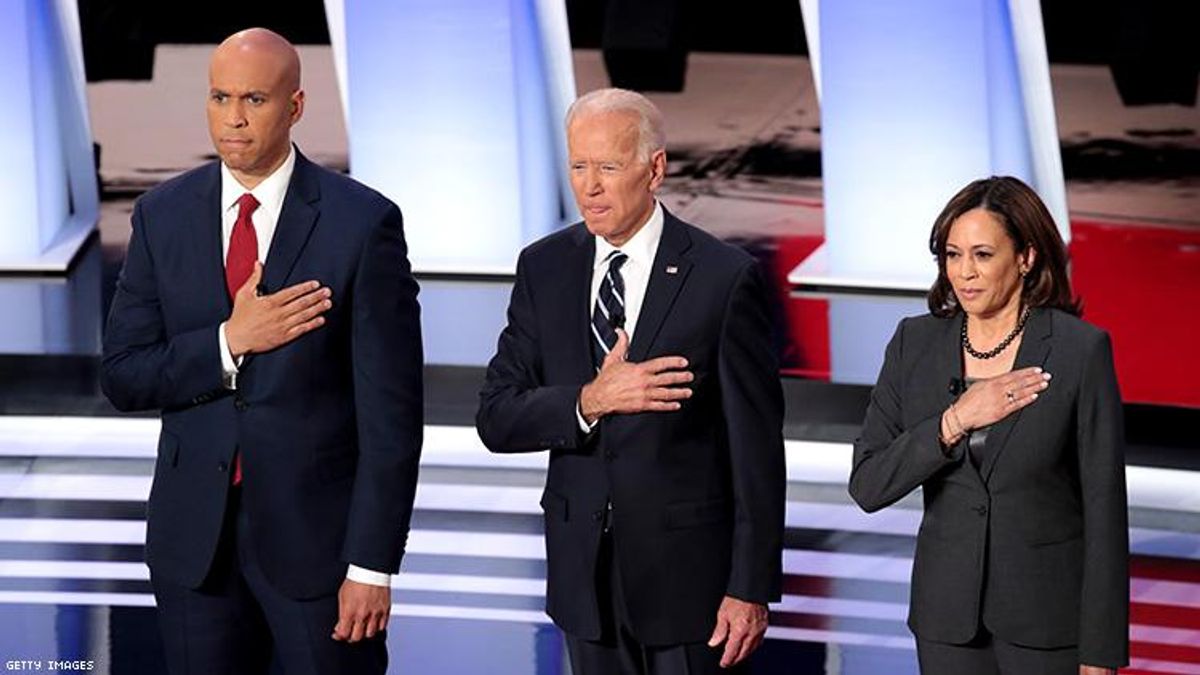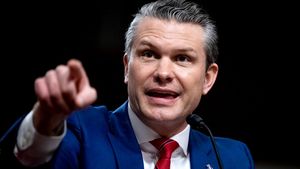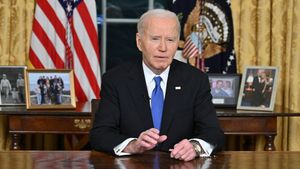The next president of the United States will represent over a million Americans living with HIV, and their administration will fund resources for the 40,000 people newly diagnosed with the virus each year. They'll be trying to live up to some of the aggressive (but some say unattainable) HIV goals, as well, like ending AIDS by 2030.
HIV advocates have long requested that presidential candidates share their HIV policy plans, though they haven’t always gotten a response. But things have begun to change, and six of the top 2020 Democratic nominee hopefuls responded to an HIV-focused survey spearheaded AIDS United, along with other members of the ACT Now: End AIDS Coalition (which is made up of GMHC, Housing Works, Positive Women’s Network-USA, Prevention Access Campaign, Sero Project, Transgender Law Center, The U.S. People Living With HIV Caucus, and 41 other community-based organizations).
The survey was sent to every major presidential candidate, including re-election seeking President Trump. So far, responses have been returned from several Democratic candidates: Cory Booker, Pete Buttigieg, Kamala Harris, Beto O’Rourke, Bernie Sanders, and Elizabeth Warren.
Not surprisingly, many of the candidates’ responses are similar. They all support the Equality Act, as well as providing more services for those living with or at-risk of HIV who are incarcerated, more funding for programs like PREPFAR and specific HIV prevention efforts like PrEP, and returning the nation to a leadership role on the world stage when it comes to HIV. Each condemns HIV and LGBTQ discrimination, the ban on those living with HIV enlisting or deploying in the Armed Forces, barriers to reproductive health care, and denying health care to people based on their immigration status. Many specifically call health care (and housing) “a human right.”
Where the candidates differ is in specific proposals and their grasp of the issues facing those living with HIV (not all of them are well versed in U=U or TasP, for example). There was also a difference in language. For example, both the Sanders and O’Rourke campaigns answered questions in the third person (e.g. “Beto will vote for…”) while the others answered in the first person (e.g. “As president, I will…”). Some seem to think maintaining current funding levels is enough, while others argue for dramatic increases for programs impacting those with HIV.
Here are summaries of each candidate along with links to their full answers (in alphabetical order).
Cory Booker pledges to “beat this epidemic” by increasing funding, removing barriers to PrEP, passing comprehensive sex education legislation, halting all administration attacks on the Affordable Care Act and on Medicaid, rescinding Trump’ rules that enable LGBTQ discrimination, increasing access to health coverage and addressing cost and other barriers that prevent PrEP access.
The Senator from New Jersey argues, “We need to use Medicare’s bargaining power to drive down the costs of prescription drugs and import drugs from Canada and other countries. We also need to pass the Prescription Drug Price Relief Act, which would lower drug prices in the U.S. by 50 percent and take patents away from drug companies that sell the same medication for less in other countries. And, we need to impose a tax on prescription drug companies that unfairly raise the price of their drugs.”
Booker supports Medicare for All and sees health care as a human right, “regardless of someone’s immigration status” age, income, whether they have a pre-existing condition, or are/have been incarcerated. He believes, “Abortion care is health care, and health care is a human right.” And says he’ll “work with Congress to pass legislation that will codify the protections of Roe v. Wade.”
Booker also views housing as a human right and says, “Programs like HOPWA aren’t just about housing--they are about healthcare and education and economic opportunity, among others. When housed, people living with HIV are far more likely to gain access to treatment and adhere to treatment.”
Booker was a co-sponsor of the Equality Act, which would protect LGBTQ people from discrimination in housing, the workplace, and public accommodations. It has passed the House but is stalled under Mitch McConnell’s Senate leadership.
“Discrimination on the basis of HIV status has no place in our country,” Booker adds. “As President, I would work to extend federal protection from discrimination based on HIV status and fight to provide the resources they need to be successful in our society. That's why I am an original co-sponsor of the Health Equity and Accountability (HEAP) Act, which would provide targeted approaches for improving awareness, health outcomes, early detection, linkage to care, and treatment for conditions that significantly impact racial and ethnic minorities.”
Read the rest of Booker's answers here.
Pete Buttigieg declares, “Within the first six months, ONAP [the Office of National AIDS Policy] will develop a revised National HIV/AIDS Strategy that truly embraces all elements of what it takes to end the epidemic.” No other candidate specifically mentioned revising the National HIV/AIDS Strategy (although as president they will have the opportunity to do so).
The core principles of Buttigieg’s HIV strategy would be to improve access to PrEP, provide equitable and “culturally competent” health care to all at risk for HIV including “men who have sex with men, trans people, injection drug users, women, [and] people of color;” to get “everyone with HIV” in treatment “so they can lead longer and higher-quality lives and so they won’t transmit HIV, since we know that U=U (undetectable equals untransmittable).” And finally, “we must address the stigma and other social determinants (poverty, lower income, housing insecurity, etc.) that often make accessing preventive and care services more challenging.”
Buttigieg does not promote universal healthcare (or Medicare for all/single-payer). Instead, he supports reversing the weakening of the Affordable Care Act and increased funding for public health infrastructure, and the creation of and investment in Health Equity Zones to support local, multi-sector community solutions to reduce health disparities.
The mayor of South Bend, Indiana does not call housing or health care “a human right.” He notes, “Housing is one of the most critical social determinants of health. We have known for some time that those who are stably housed are more likely to have improved health outcomes once they enter care. This has been shown again and again for those living with HIV.”
A gay man, Buttigieg was one of the few candidates to specifically address HIV criminalization (rather than discrimination at large) and states, “I can assure you that my Department of Justice will not prosecute people (or seek enhanced sentencing) because of their HIV status.” Of course, the majority of the statutes criminalizing HIV are state level, and therefore not the purview of the federal government.
When it comes to providing health care for immigrants, Buttigieg notes, “We will never end the AIDS epidemic if we push one segment of the at-risk population underground. It is morally wrong, and it is very bad public health practice. In a Buttigieg Administration, we will reverse any public charge provisions that the Trump administration puts in place. We will clarify — through policy and a public education campaign — that all immigrants, regardless of status are welcome to be served in all public health programs, including Ryan White, community health centers, and publicly funded family planning and STI clinics.”
Buttigieg also promises “a national strategy on reproductive health and wellness that strengthens access not only to abortion but to all aspects of reproductive health, from sex education to research, to coverage and clinical care.”
Read the rest of Buttigieg's answers here.
Kamala Harris says, “I strongly believe affordable health care should be a right, not a privilege.” She supports Medicare for All, increasing federal funding for HIV research, and would push for the passage of the PrEP Access and Coverage Act, which she recently introduced and would require public and private health insurers to cover PrEP. “Ensuring that PrEP, as well as the required tests and follow-up visits, are covered cost-free as part of all insurance plans (including Medicare and Medicaid) will help make sure everyone who could benefit from the medication is able to take it and help increase awareness about steps we can take to prevent further transmissions.”
The California Senator also says “I will take executive action as president to hold pharmaceutical companies accountable if they engage in price gouging and fight to give the Department of Health and Human Services the authority to set ceilings for prescription drug prices to put them in line with countries such as Canada and Germany.”
Harris is a co-sponsor of the Equality Act and says, “fighting to pass it will be one of my top priorities as president.”
Addressing HIV criminalization, Harris says, “I support reversing outdated laws that continue to stigmatize individuals with HIV. Furthermore, we need to ensure that we are enforcing laws already on the books that prevent discrimination against individuals on the basis of their HIV status.”
Speaking about immigrants, Harris pledges, “As president, I will never support a proposal that denies people public education, public safety, or public health.” She also “We have to fight back against this all-out assault on reproductive rights.” To do so, she says, “I will fight to make sure everyone who needs it has access to the full range of reproductive healthcare services including safe and legal abortions. That’s why I will protect Planned Parenthood from Republican attempts to defund essential health services, fight to repeal the Hyde Amendment, and reverse the Trump Administration’s attempts to cut evidence-based Teen Pregnancy Prevention Program grants. And I am calling for a Reproductive Rights Act that I will fight to sign into law as president. Under this plan, states with a history of unconstitutionally restricting access to abortion will be required to pre-clear any new law or practice with the Justice Department before it can be enacted.”
Read the rest of Harris's answers here.
Beto O'Rourke believes that tackling the epidemic requires addressing, “societal barriers and discrimination facing people with HIV. As President, Beto will ensure that health insurance and health care includes access to HIV prevention and treatment, by fully enforcing the nondiscrimination protections in the ACA and by including protections in any new system of universal health insurance.”
Arguing that “health care is a right and not a privilege,” he believes, “reproductive health care services and the right to control one’s own body is a fundamental part of health care,” and “we must ensure all Americans have access to universal, guaranteed, high-quality health care.”
Until then, he supports increased funding for “the demonstrably effective Ryan White Program and for networks of people living with HIV that provide peer support and combat stigma.”
O’Rourke also wants to see more funding for PrEP, and calls “failing to educate our families and communities about it,” both a “moral failure and a public health failure of the highest magnitude.”
The former congressman from Texas promises to tackle “price gouging by drug companies so critical and effective treatments like PrEP are accessible and affordable.” And as president, he pledges to lower the cost of prescription drugs, by “allowing drug importation from Europe and Canada; modifying regulations that get generic drugs on the market faster; ensuring universal, guaranteed, high-quality health care for all Americans through Medicare for America.”
He supports increased funding for the HOPWA program and says, “We know that people living with HIV who are homeless — like other homeless Americans — are less likely to have access to healthcare, are less likely to have access to and adhere to their prescriptions, and are more likely to use the emergency room as their health care provider.”
Stating, “Our HIV policies must be based on science and not fear or discrimination,” O’Rourke’s campaign says, “Medical science tells us that undetectable means untransmittable (U = U), and Beto understands that medications can allow a person living with HIV to achieve undetectable levels.”
He believes public education and “treating individuals with HIV with respect” are the best approaches to “destroying the stigma associated with HIV. That stigma, and the discrimination suffered by those with HIV, hinder discussions about HIV prevention and PrEP and drive people away from testing and treatment – and so do laws criminalizing HIV.”
Pointing out that “Science tells us that laws criminalizing HIV status do not achieve real health benefits,” O’Rourke supports the REPEAL (Repeal Existing Policies that Encourage and Allow Legal) HIV Discrimination Act.
O’Rourke was the only candidate to specifically address the aging population, arguing, the country, must “recognize the discrimination facing older Americans who, despite having started to live openly and honestly, are forced to hide their sexual orientation as they try to access those assisted living facilities or nursing homes in which homophobia is still prevalent. Recognizing that nearly half of people living with HIV are more than fifty years old, we must ensure that these Americans are not forced to hide their health status or sexual orientation for fear of losing their access to nursing home facilities.”
He also detailed how he would support the transgender community, including by “directing his Department of Justice to investigate the crimes against transgender people, specifically transgender women of color; by ensuring law enforcement agencies receive training related to implicit bias, use of force and accurately reporting the gender of victims; by reinstating the Bureau of Prisons (BOP)’Transgender Offender Manual’ to ensure safe housing for transgender people in BOP custody; and by modernizing federal law to allow transgender people to update their name and gender on identity documents.”
A co-sponsor of the Equality Act, O’Rourke says he would also create an Interagency Task Force on LGBTQ+ Nondiscrimination.
Read the rest of O’Rourke's answers here.
Bernie Sanders believes we can set and reach a national goal of ending the HIV epidemic in the U.S. by the year 2025 “so that HIV is no longer a public health threat to any community in the U.S. and that people with HIV are able to live long healthy lives.” He does not have a plan ready for achieving that goal, but argues, “We must also appoint people living with HIV, community and public health experts and government officials to the HIV/AIDS Task Force to develop specific recommendations.”
He believes health providers, social services, law enforcement, and all other entities must have the “proper resources and training to handle the varying needs of the communities they serve — especially the community living with and affected by HIV/AIDS — without discrimination.”
Sanders supports Medicare for All, “which will guarantee health care as a human right to everyone in America, free at the point of service.” He believes this plan will “address the racial disparities we still see in the epidemic — people of color are disproportionately uninsured.” The Senator from Vermont also says it will “address the need for more Black doctors, more Black dentists, more Black nurses, more Black psychologists. We are talking about guaranteeing healthcare to all as a right, but at the same time ending the long-standing disparities which exist within the health care system.”
To address high prescription drug prices, Sanders says he will create “a multi-billion dollar prize fund to reward medical researchers and developers of medicines who create lifesaving drugs for HIV and AIDS treatment and prevention based primarily upon the added therapeutic value a new treatment offers and the number of people it benefits — instead of a system where the market is manipulated to keep out all competition. Under Bernie’s plan, drugs would have generic competition immediately after FDA approval.”
To “address the social determinants of health, Bernie will guarantee all Americans economic rights. These include the right to a complete quality education, a decent job with good pay, affordable housing, quality health care, a clean environment, and a secure retirement.
Sanders detailed how his administration would tackle the opioid drug crisis (beyond free addiction treatment services as part of single-payer health care), including by “funding the State Opioid Response Grants program,” holding pharma companies accountable and passing an Opioid Crisis Accountability Act.
Beyond co-sponsoring the Equality Act and pledging to pass “the Every Child Deserves a Family Act and other bills to prohibit discrimination against LGBTQ+ people,” Sanders added that his support for LGBTQ people would include, opposing “any legislation that falsely purports to ‘protect’ religious liberty at the expense of others’ rights,” and supporting “police departments that adopt policies to ensure fairer interactions with transgender people, especially transgender women of color who are often targeted by police unfairly, and by instituting training programs to promote compliance with fair policies.”
Sanders says he will also work to pass a law that ends the criminalization of HIV status.
Sanders believes “Medicare for All means guaranteeing health care as a right for everyone in the United States, regardless of their immigration status.” And he supports reproductive rights, arguing, that we must “defend the right to control your own body and ensure LGBTQ+ people are free from discrimination by providers.” His Medicare for All program would appeal the Hyde Amendment; provide free comprehensive reproductive health coverage; fully fund Planned Parenthood, Title X, and other initiatives that protect healthcare, access to contraception, and the availability of a safe and legal abortion; and address the nation’s health-based racial disparities.
Read the rest of Sanders's answers here.
Elizabeth Warren says “There is no single answer to ending this epidemic — we must use every tool at our disposal. That includes Medicare for All, expanding HIV research and treatment, ensuring everyone has access to PrEP and HIV testing, holding drug companies accountable and lowering drug prices, ending the opioid crisis, ensuring that community health centers receive robust funding, and reinstating our position as global leader in public health. It also means expanding economic opportunities, tackling the housing crisis, banning private prisons and exploitative contractors, overturning HIV-status criminalization and discrimination laws and regulations, and ensuring comprehensive, inclusive reproductive and sexual health education and services.”
Believing that health care is a human right, Warren supports Medicare for All, but also wants to see more funding for the National Institutes of Health to conduct research in treating HIV and finding a cure. She introduced the National Biomedical Research Act, a bill that would establish a reliable funding stream for the NIH by establishing a $5 billion Biomedical Innovation Fund at the NIH. Warren was also a co-sponsored the HOPE (HIV Organ Policy Equity) Act that has made it possible for people living with HIV to receive transplants from an HIV-positive organ donor.
To address the opioid crisis and fight substance abuse, Warren co-introduced comprehensive legislation called The CARE Act, which commits $100 billion over 10 years, including $2.7 billion to the hardest-hit communities and $1.1 billion for organizations working with underserved populations, such as those living with HIV.
A co-sponsor of the REPEAL (Repeal Existing Policies that Encourage and Allow Legal) HIV Discrimination Act (which would eliminate discriminatory federal and state laws and regulations that criminalize people living with HIV), Warren notes that “26 states still have laws on the books that criminalize HIV exposure, permitting discrimination against those living with and those believed to have HIV. These laws aren’t supported by science or evidence, discourage people from getting tested and treated, and result in increased stigmatization and discrimination against already marginalized populations.”
To bring down the cost of prescription drugs Warren introduced the Affordable Drug Manufacturing Act, “which would allow the government to manufacture a generic drug when no company is manufacturing a drug, where only one or two companies is manufacturing the drug and prices are spiking, where there is a shortage of the drug, or where the medicine is essential and faces limited competition and high prices.”
In addition, Warren has also introduced the Capping Prescription Costs Act, which would cap family prescription costs at $500/month. She co-sponsored the Prescription Drug Price Relief Act, which would peg prescription drug prices to median prices of comparable countries, and the Affordable Medications Act, which would allow Medicare “to negotiate lower drug prices, block anticompetitive behavior, crackdown on a range of practices that brand-name and generic drug manufacturers use to keep prices high, and support innovation.”
A co-sponsor of the Equality Act, Warren believes “every person in the country should be treated with dignity and respect — and that includes having the right to live a healthy life.” She notes that the majority of those living with HIV “are LGBTQ+, are from communities of color, and are contending with multiple barriers that prevent them from accessing the care they should have. We must demand more for them and for their futures.”
Her Housing Plan for America would expand the Fair Housing Act to prohibit discrimination on the basis of sexual orientation or gender identity. Warren calls discrimination against transgender Americans “unconstitutional” and in addition to fully uphold civil rights and nondiscrimination protections, she says she will “direct the CDC to collect accurate data on the health of transgender people.”
Warren also believes, “No person should be denied access to a doctor and critical health services because of their immigration status.” And “Everyone — no matter where they live, where they’re from, how much money they make, the color of their skin, their gender identity, or their sexual orientation — are entitled to access high-quality, evidence-based reproductive and sexual health care. My Plan to Protect Choice calls on Congress to pass new federal laws that protect access to reproductive care. That includes creating federal, statutory rights that parallel the constitutional right in Roe v. Wade, and fully supporting Title X family planning funding. We must also repeal the Hyde Amendment, which blocks abortion coverage under federally funded health care programs like Medicaid, the VA, and the Indian Health Service.” (Warren was the only candidate to mention the health provider for Native Americans.)
Warren’s proposals for reforming the correctional system include “banning private prisons and detention facilities outright,” and supporting transition-related surgeries in correctional facilities. She co-sponsored the Solitary Confinement Reform Act, which would “reform the practice of solitary confinement and ban it as a practice to separate LGBTQ people and those living with HIV from the general population.” And she co-sponsored the Youth Access to Sexual Health Services Act “to ensure marginalized young people, including those in juvenile detention, have access to sexual health services.”
Read the rest of Warren's answers here.
You can also read all the responses at AIDS United, which will be updated as more come in.















































































